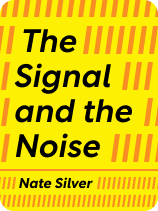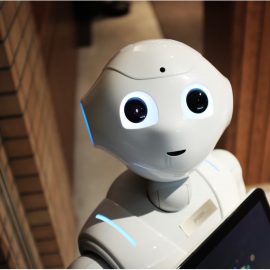

This article is an excerpt from the Shortform book guide to "The Signal and the Noise" by Nate Silver. Shortform has the world's best summaries and analyses of books you should be reading.
Like this article? Sign up for a free trial here.
Why is it hard to make predictions? How can you tell what the future has in store for you?
According to The Signal and the Noise by Nate Silver, prediction is an inherently challenging endeavor. He explores how insufficient information, system complexity, and the tendency of small errors to compound all limit the accuracy of predictions.
Here’s why you can’t predict the future and the challenges you’ll face when attempting to.
1. We Often Lack Sufficient Information
The first reason why you can’t predict the future is that you might be lacking sufficient information. To make good predictions, Silver says, you need information about the phenomenon you’re trying to predict as well as a good understanding of how that phenomenon works. For example, today’s meteorologists have abundant information about atmospheric conditions as well as a good understanding of the physical laws by which those conditions develop. Accordingly, Silver says, they can make reasonably accurate predictions about the weather.
(Shortform note: Though Silver regards meteorology as a relatively successful field when it comes to predictions, some scientists suggest that climate change may have affected the accuracy of weather forecasts since The Signal and the Noise was published in 2012. Specifically, one study suggests that shifting temperature patterns have made it harder to predict summer precipitation—which could in turn make it harder to predict catastrophic floods such as those that afflicted large portions of Europe in 2021.)
The problem is that in many situations, we don’t have much useful data to go on. Silver illustrates this point by comparing meteorology to seismology, explaining that seismologists have no way to predict the timing, location, or strength of specific earthquakes. That’s because earthquakes happen rarely and on a geological timescale, which makes it hard to discern any patterns that might be at play. And whereas meteorologists can directly observe atmospheric conditions, there’s no way to measure factors such as the pressures currently at work on a given fault line nor to foresee future tectonic activity.
(Shortform note: Seismology also highlights a related problem—sometimes we’re not even sure how to interpret the data we do have because we don’t have a sufficient theory about how a given phenomenon works. For example, though geologists agree that earthquakes result from ruptures along tectonic fault lines, they’re still not sure why some ruptures release energy more quickly (and dangerously) than others. So even if we suddenly had much more information about earthquakes and the forces that drive them, it might take a while to develop a workable theory that could turn that information into reliable predictions.)
2. Many Systems Are Too Complex to Fully Understand
Also, Silver argues that even when we have rich data and a good understanding of the underlying principles, many systems still defy accurate prediction because of their inherent complexity. Silver discusses economic forecasts—which he says are notoriously unreliable—to lay out several ways complex systems hinder forecasting:
- They blur cause and effect, making it hard to determine root causes. For example, unemployment leads to a lack of consumer demand, which causes companies to scale down production and cut their workforces—which raises unemployment.
- They contain feedback loops that complicate their behaviors. For instance, employers, consumers, and politicians all make decisions based on economic forecasts, which means that the forecasts themselves can change the outcomes they’re meant to predict.
- Their rules and current status are unclear. Silver points out that economists don’t agree on what indicators might predict recessions; moreover, they often don’t realize when the economy is already in a recession (only recognizing that after the fact).
(Shortform note: With online banking and digital payments becoming ever more common, some experts argue that economic forecasters may be starting to improve on these weaknesses. Since the Covid-19 pandemic, economists have relied more heavily on real-time data to glean an up-to-the-minute understanding of factors such as consumer behaviors and supply chain delays. This improved understanding may help them to better discern the current state of the economy and to untangle the complicated causal and feedback loops Silver describes.)
3. Small Errors Compound
Finally, Silver explains that even when you have good data and you’re not dealing with an inherently unpredictable system like the economy, your predictions are still limited by the fact that even minuscule mistakes in the predictive process compound into large errors over time. Silver argues that this principle of compounding error is at work even in fields with relatively accurate predictions, such as meteorology. Because each day’s weather depends on the previous day’s conditions, even the smallest inaccuracy in the initial data you plug into a simulation will add up to big discrepancies over time. Silver says that’s why weather forecasts are generally accurate a few days out but become increasingly unreliable the further into the future they try to predict.
(Shortform note: In fact, the current scientific consensus suggests that perfect long-range predictions may never be possible in any field. That’s because, as we’ve discussed, accurate predictions rely on accurate theory and accurate observations—and there may be a fundamental limitation on the latter. In A Brief History of Time, Stephen Hawking explains that the nature of physics guarantees a degree of uncertainty in our measurements, which means that even if we had a perfect theory of physics (which we don’t), we’d still be unable to perfectly predict the future because we’d be unable to accurately measure the current conditions—a fact that, as Silver explains, would lead to compounding errors down the line.)

———End of Preview———
Like what you just read? Read the rest of the world's best book summary and analysis of Nate Silver's "The Signal and the Noise" at Shortform.
Here's what you'll find in our full The Signal and the Noise summary:
- Why humans are bad at making predictions
- How to overcome the mental mistakes that lead to incorrect assumptions
- How to use the Bayesian inference method to improve forecasts






